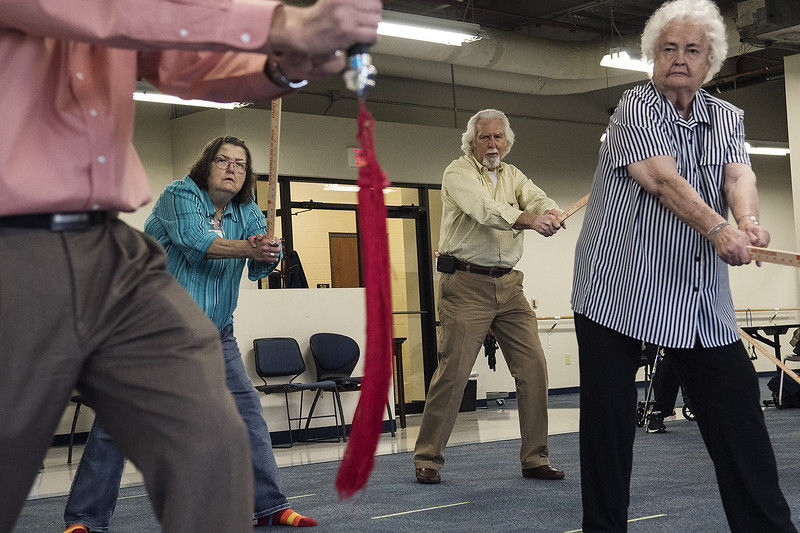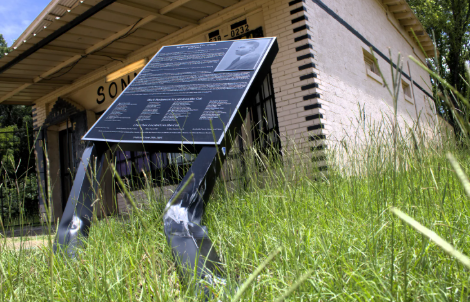UT Tyler improves lives of peripheral neuropathy patients through Tai Chi
Published 6:50 pm Wednesday, February 22, 2017

- Paula Rozell of Whitehouse, Jim Law of Rusk and Sally Bradley of Flint watch Dr. Yong Wang as he leads their tai chi class at the University of Texas at Tyler Tuesday Feb. 21, 2017. The class started as a three month study on the effects of tai chi on patients with peripheral neuropathy and is continued as a community service. (Sarah A. Miller/Tyler Morning Telegraph)
CORY MCCOY, comccoy@tylerpaper.com
Paula Rozell breathes in and finds her center, letting the stress of her fight against cancer wash away.
Trending
She focuses on her breathing and movements, throwing herself into the ancient art of Tai Chi.
She is at peace, surrounded by the family she has built over two years taking the Tai Chi class.
Many of the participants set canes and walkers aside, pushing themselves to work on posture, breathing and balance.
The group began as a three-month study into the effects of Tai Chi on peripheral neuropathy.
Some of the group members saw a commercial on TV, while others responded to a classified ad in the newspaper.
Now more than two years later the group has become a second family for the attendees who continue to gather twice a week at UT Tyler, getting exercise, supporting each other and helping UT Tyler advance research into the benefits of a healthy mind and body balance.
Trending
The enthusiasm and determination of the study participants was so great that organizer Dr. Joyce Ballard used her endowments to continue the class as a public service. Dr. Ballard and her colleague Dr. Arturo Arce-Esquivel originally focused their research on 37 patients dealing with peripheral neuropathy in their feet due to a variety of health issues.
Mrs. Rozell, who now is in her third bought of chemotherapy, was among them.
“I didn’t know what it would be like. I used to fall out, I would have serious falls,” she said, adding the support of the group has helped her cope with her illness.
“Having all of them, and they all love me, helps so much. They’re all very supportive. They’re some of my best friends now.”
The class is led by Dr. Yong Wang, dean of the college of nursing and health sciences. Through his career Dr. Wang has helped develop many variations of the exercise for patients including a type of wheelchair Tai Chi. Wang said Tai Chi has been shown to help patients dealing with Parkinson’s Disease, shingles, cancer and many other afflictions.
In the 2015 study, researchers found the three-month period of practicing Tai Chi helped improve vascular function and reactivity by 25 percent in the affected extremities. Patients also reported improved balance and sensation.
“The theory is the Yin and Yang balance, body and mind,” Wang said. “The movement is combined with diaphragmatic breathing.”
But the class didn’t just improve the patients’ health.
Mrs. Rozell said the class is her “happy place.”
“This is the highlight of my week,” she said. “It takes me away from my duties. It’s a time where I don’t have to worry.”
Dr. Ballard said she has watched Mrs. Rozell and the other participants improve their lives as they integrate Tai Chi into their healthcare routines.
“They are highly motivated; they feel it’s helped a lot,” Dr. Ballard said, adding the anonymous donor whose estate has funded her research and supported this class would be very pleased by the impact of her gift.
“I think about how happy she’s made this group,” Dr. Ballard said.
Nearly two years after the study began in summer 2015, Brittany Murley has joined the group as a researcher as she works toward her P.hD in nursing research, her focus examines the effects of exercise on cancer patients.
“We’re hoping to find sustained benefit two years later. Positive impact on neuropathy and long term success,” she said. “I think Tai Chi is something that anyone can do, which is what excited me about it. This is something that can be applicable to people in any shape.”
Ms. Murley said she was surprised to learn how close the group had become, noting their support system also lent benefits to recovery.
“They are fostering strength, balance and mental health,” she said. “With the social support aspect, they’re a solid group.”
Dr. Wang said the confidence built by studying the martial art is one of the biggest benefits to patients.
“I think it really improves mental health. You’ve got to feel good about yourself,” he said. “If you’re relaxed and happy, your immune system improves.”
Twitter: @TMT_Cory
Clarification: The original version of this article stated the class was open to the public. It is actually free to participants. Peripheral Neuropathy patients interested in attending should contact Dr. Wang at
ywang@uttyler.edu






